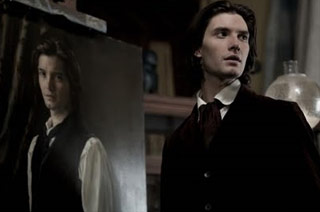
| HOME |
| NERVE |
| REVIEWS |
| ARCHIVE |
| EVENTS |
| LINKS |
| ABOUT US |
| CONTRIBUTORS |
| BACK ISSUES |
| CONTACT US |
 Dorian Gray
(15)
Dorian Gray
(15)
Directed by Oliver Parker
Based on a novel by Oscar Wilde
On general release from 11th September 2009
Reviewed by Adam Ford
Oliver Parker's version of Oscar Wilde's The Picture Of Dorian Gray is an exceptionally rare thing: a big screen adaptation that does justice to a classic novel. Though of course some changes have been made, they do not detract from the narrative or the essential feel of the story. Wilde enthusiasts can be confident that they won't be disappointed, so long as they keep an open mind, while curious newcomers are in for a treat.
As many people know, Dorian Gray (Ben Barnes) is a naive boyish aristocrat who inherits his grandfather's estate. Artist Basil Hallward (Ben Chaplin) is impressed by Gray's youthful beauty, and tries to capture it in a portrait, which he insists will never grow old. However, sly man-about-town Henry Wotton (Colin Firth) takes the youngster under his wing, and encourages him to indulge in pleasures of the flesh. From that moment, Dorian's every act of deception has harmful effects on those around him, and he is left utterly alone, even when surrounded by people. The picture becomes a mirror for his decaying 'soul', even as its subject does not outwardly age one single day.
While Barnes is scarily convincing in his transformation from childlike innocence to devilish deceiver, it is Firth who steals the show, proving he has far greater acting range than he's been allowed to demonstrate since his TV role as Mr Darcy in Pride and Prejudice. The use of special effects is also impressive; for once it isn't about showing off, rather they are used to heighten the appreciation of the lead character's thoughts and emotions. In Parker's hands, this is a true psychological horror film, about a real strain of psychological horror, with implications for views of society.
When Oscar Wilde wrote The Picture Of Dorian Gray in 1890, it was a key moment in the artistic movement known as aestheticism. Aesthetes were wealthy, often aristocratic artists who rejected industrialism - especially its pre-occupation with usefulness and the Victorian morality that came with it. But Wilde's work was a scarred man's wistful search for a happy medium, which recognised that such individualistic pursuit of empty pleasures came at a high cost. Wotton's quip that "The only way to resist temptation is to yield to it" certainly has a ring of truth in it, but it is a hollow one. In modern times, it finds its echo in the obsessive chronicles of 'celebrity lifestyles' that fill countless shelves and waste bins.
Wilde's classic tale raises important questions about how we pursue happiness in societies based on competition, and this film adaptation fully brings that significance to life. In response to critics who wanted art to serve their own agendas, the author famously claimed that 'All art is quite useless.' But art like his parable and this film are as useful to the cause of humanity as they are aesthetically pleasing.